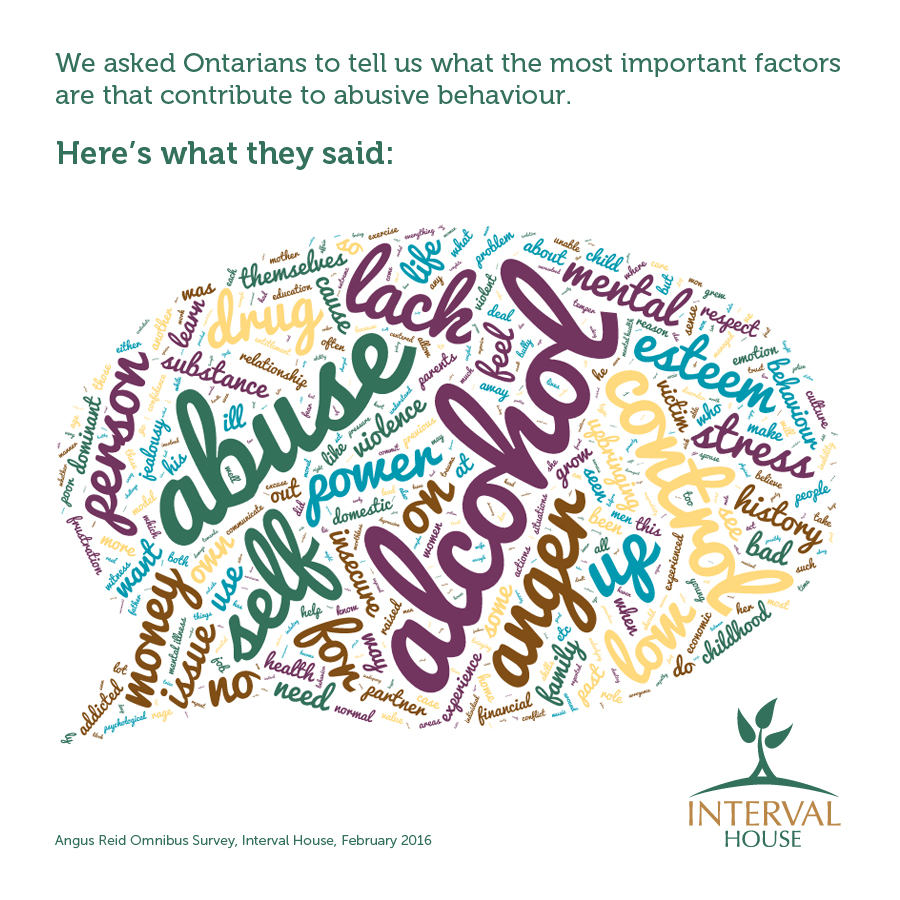
In February of this year, Interval House posed this question to Ontarians through an Angus Reid Omnibus Survey: “What are the most important factors that contribute to abusive behaviour?” We let them answer in their own words and used the most common responses to make a word cloud. Each week for the next month, we’re addressing a common attitude about the causes of domestic violence to investigate: is it true? Or is it a myth? In this post, we answer: do mental illness or anger management issues cause domestic violence?
When we asked Ontarians about the causes of abusive behaviour, some of the common words that came up were “anger,” “stress,” and “mental.”
 This is another commonly-held belief: that abusers have mental health issues, or don’t know how to control their anger and this is why they abuse. Is this true?
This is another commonly-held belief: that abusers have mental health issues, or don’t know how to control their anger and this is why they abuse. Is this true?
Mental Health & Domestic Violence
It’s common to think of abusers as mentally ill people in need of support. There’s not much research available on this topic that says definitively one way or the other if this is true. Still, this may sometimes be the case: that an abuser is also struggling with mental health issues. But the reality is that mental health and domestic violence need to be treated separately.
Last week, we talked about addiction and substance abuse, and how an abuser who’s working to stop abusing substances won’t automatically stop perpetrating violence. The same goes for mental illness: an abuser who is struggling with mental illness won’t necessarily stop their violent behaviour if they seek help for their mental health.
Mental health is an important and often stigmatized issue, and it’s important for people affected by mental illness to receive the care and support they require. But mental illness isn’t an explanation or excuse for domestic violence.
Violence in intimate relationships is still caused by a belief that one partner is entitled to power and control over the other. As the National Domestic Hotline writes: “If your partner has a mental illness and is abusive towards you, it’s important to keep in mind that the mental illness and the abusive behaviors need to be handled separately by the abusive partner. It is the abusive partner’s responsibility to seek out support and create their own plan for managing their mental illness and be accountable for their abusive behavior.”1
There’s another link between mental health and domestic violence that we should mention: the mental health implications on survivors of violence. Domestic violence often leads to survivors developing mental health issues. And people struggling with mental illness are more vulnerable, and so are more likely to experience domestic violence.2 It’s important to think about this correlation when we talk about mental health and domestic violence too.
Anger Management & Domestic Violence
On a related topic, many people think of domestic abusers as people with violent tempers. The idea here is that if they would just learn to control their bad temper, they would be able to stop the abuse.
Anger itself can actually be a healthy emotion when expressed properly. But people with “anger management” issues struggle to express anger in a way that’s healthy and appropriate. If abusers have anger management issues, then it’s implied that they don’t have a choice – they can’t help themselves from becoming violent and flying off the handle.
The problem with this idea is that abusers are often strategic and purposeful in their violence. Domestic violence is a choice, one that is often planned and strategic on the part of the abuser. Abusers have specifically targeted their intimate partner as the recipient of their violence. Time and time again, we see abusers who are high-functioning and social in other parts of their life – charismatic celebrities, popular politicians, respected community members – who behind closed doors, terrorize their partner.
Domestic violence is meant to “control, intimidate, and subjugate another human being.”3 In contrast, people with anger management issues aren’t able to control the target of their anger, and are less strategic in directing their rage.
This isn’t to say that some abusers don’t have anger management issues, but rather that it’s not one and the same. And again, the issues need to be treated separately. For this reason, many anti-violence organizations advocate for programs for convicted abusers that deal with domestic violence specifically, rather than general anger management programs.
Stay tuned for the next post in our myth-busting series, where we tackle the question: does a history of childhood abuse cause abusive behaviour?
- Part 1: What are the causes of domestic violence?
- Part 2: Does substance abuse cause domestic violence?
- Part 3: Does mental illness or anger cause domestic violence?
- Part 4: Does a history of childhood abuse cause abusive behaviour?
- Part 5: Is domestic violence about power and control?
Sources:
